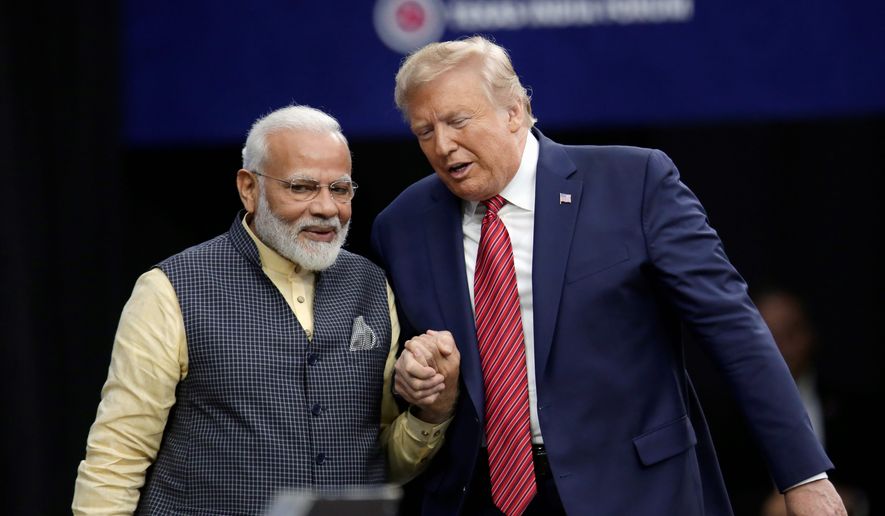President Trump rallied Sunday with Indian Prime Minister Narendra Modi in Houston, combining forces with a leader who has made similar appeals to nationalism as he tries to gather support from the Indian American voting bloc in Texas, an emerging political battleground.
The crowd cheered as Mr. Trump pledged to help Texans suffering from rampant flooding — two years after Hurricane Harvey — and heaped praise on the 4 million Americans who claim Indian heritage.
“You enrich our culture, you uphold our values, you uplift our communities and you are truly proud to be American and we are proud to have you as Americans. We thank you, we love you and I want you to know my administration is fighting for you each and every day,” the president told an audience of roughly 50,000 at NRG Stadium, home to the NFL’s Houston Texans.
He also made an emotional appeal to fight “radial Islamic terrorism,” eliciting a standing ovation from the crowd.
Mr. Trump called India a “true and great friend” of the U.S., returning the favor after Mr. Modi had lifted up Mr. Trump as the foremost figure in the world.
“His name is familiar to every person on the planet,” Mr. Modi said. “His name comes up in almost every conversation in the world on global politics.”
Houston is located in Harris County, which Mr. Trump lost by 12 percentage points in 2016 and is viewed as a critical piece of political real estate in Texas.
Democrats vying for the 2020 presidential nomination held their most recent primary debate in Houston, further underscoring its status as a state that could be up for grabs.
“Texas does seem to be trending Democratic, but the president did still win it by 9 points. It would take a big erosion for the president to lose it,” said Kyle Kondik, managing editor of Larry Sabato’s Crystal Ball at the University of Virginia Center for Politics.
Some polling shows Texas as competitive, however, “and obviously the president absolutely cannot afford to lose it,” Mr. Kondik said.
Mr. Trump insisted he’s still leading in Texas, but he doesn’t want supporters to become complacent.
“I don’t see how it’s possible to lose Texas. They want border security. They want to protect their Second Amendment, they want a lot of things we stand for,” he said Sunday. “I don’t see how it’s possible, but if people think you’re going to win and win by a lot they don’t go out to vote.”
Indian Americans tend to vote Democratic, though they could prove critical to Mr. Trump’s fortunes in Texas if he can make inroads.
The Houston area alone is home to nearly 140,000 Indian American, according to AAPI Data, which tracks Asian American and Pacific Islander populations.
Mr. Trump has placed Indian Americans in high positions, including Nikki Haley as his former U.N. ambassador, Ajit Pai as chairman of the Federal Communications Commission and Seema Verma as chief of public insurance programs.
Highly educated Indians also might like his business-friendly policies.
But his strident immigration rhetoric and efforts to reel in visas that benefit Indian Americans, in particular, could be turning them off, said Karthick Ramakrishnan, a public policy professor at the University of California, Riverside and founder of AAPI Data.
“I don’t think he’s going to necessarily gain a lot of supporters but he might blunt some of the damage among Indian Americans and Asian Americans, to show a friendly face,” he said.
There has been some friction between Mr. Trump and Mr. Modi.
Mr. Trump in March decided to end a trade-preference agreement that allowed India to send billions of dollars’ worth of its exports into the U.S. duty-free. And the president claimed Mr. Modi asked him to negotiate the Indian-Pakistani clash over Kashmir, forcing the Modi administration to issue a denial.
Still, Mr. Trump saw little downside to joining forces with Mr. Modi on stage in Houston.
Many Indian Americans are motivated by domestic issues in the U.S., but among those who pay attention to foreign policy and India relations, “Modi seems to be quite popular,” according to Mr. Ramakrishnan.
The belief is that “in many ways he’s trying to reform India, trying to clean up the corruption there,” he said.
On stage, Mr. Trump pointed to Mr. Modi’s push to lift people out of poverty, before pivoting to low unemployment in Texas under his administration.
Mr. Trump said he will take care of legal Indian immigrants ahead of migrants who “pour into our country” illegally.
Mr. Ramakrishnan said while Mr. Trump and Mr. Modi relish their roles as reformers, “they also are playing with fire a bit when it comes to the forces of ethnic nationalism.”
Democrats vying for the 2020 nomination have repeatedly accused Mr. Trump of fanning the flames of white nationalism, particularly with his disparaging comments about immigrants who are in the country illegally and his reaction to the white supremacist rally in Charlottesville, Virginia, in 2017.
Critics say Mr. Modi, meanwhile, took his vision of a unified, Hindu-dominated nation too far by moving to strip Muslim-majority Kashmir region of its special autonomous status.
Kashmiri residents have complained of security forces patrolling the streets, making them fearful to leave their homes, and say communication systems have been shut down or limited.
Justice for All, which bills itself as an interfaith human rights group, said it gathered 20,000 people to protest the Houston rally.
• Tom Howell Jr. can be reached at thowell@washingtontimes.com.




Please read our comment policy before commenting.